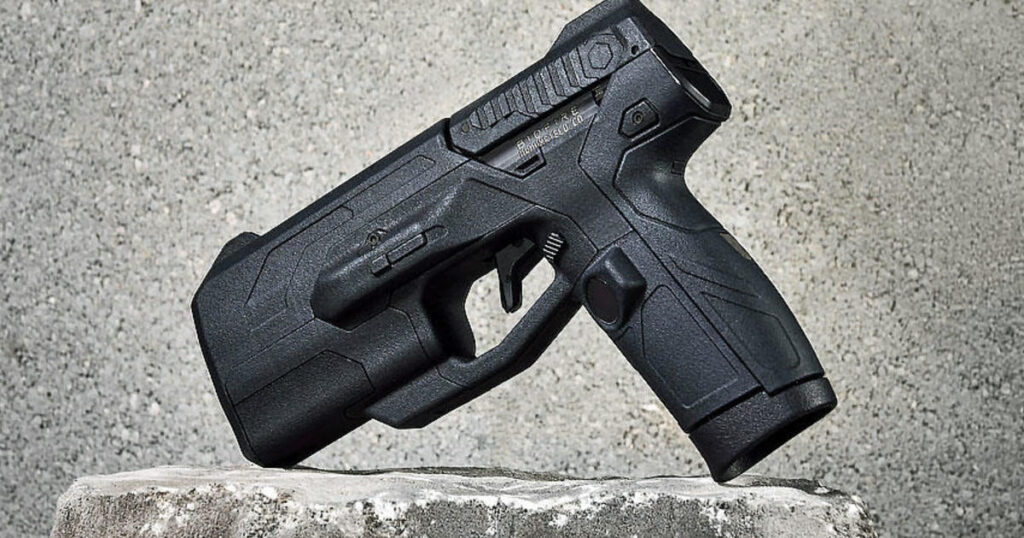Gun violence is an increasing problem in the US, claiming thousands of lives annually through accidents, suicides and theft. Colorado-based Biofire has developed an intelligent gun which only lets authorised users fire it. Pre-order now to avoid disappointment! It uses facial and fingerprint recognition technology for unlocking its weapon.

Biometrics
The Biofire Smart Gun’s design – part Halo, part Cyberpunk – makes it seem more like something from an action movie than an actual firearm. However, this is intentional as its cutting-edge technology takes inspiration directly from science fiction; to unlock it an authorized user must use either fingerprint recognition or facial recognition technology, as well as an additional backup PIN pad system.
Biometrics provide an effective security measure since, unlike passwords or cards, they’re difficult to forget, exchange or falsify. Furthermore, they’re more reliable than token-based technologies since they don’t rely on an individual physically presenting objects to the system. Biometrics may raise privacy issues as it requires collecting and storing an individual’s physiological or behavioral characteristics for identification purposes; such data could then be used against them in the future, and some individuals may not want to provide it in order to ensure public safety.
Safety
Gun ownership is a constitutional right, yet comes with its own set of responsibilities. A firearm in the wrong hands can be deadly and lead to accidental shootings or even fatalities – this is why advocates are calling for biometric smart guns that monitor how users handle firearms to reduce accidents, suicides and homicides. Traditional attempts at smart guns involve altering existing mechanisms by adding some kind of lock that prevents use until an RFID tag, ring, bracelet, or fingerprint sensor is used to unlock it – though such locks can easily be bypassed due to things like dirty fingers, dropped weapons or dead batteries.
Colorado startup Biofire claims to have created the world’s first practical, biometrically secured smart gun – now accepting preorders – using facial recognition and fingerprint scanning technology to instantly open when picked up, then close again when placed down again.
Security
As the United States debates gun-control issues, a Colorado startup has unveiled America’s first biometric smart gun: an 8mm handgun which uses fingerprint and facial recognition technology to unlock itself so only its owner can fire it.This month, the company is unveiling their gun which can be unlocked within seconds by authorized users using biometric technology similar to what smartphones use to unlock themselves adapted specifically for firearms.
Kloepfer, 26, lived in Aurora near where gunman Omar Mateen shot dead 12 people at an Aurora cinema during midnight showing of The Dark Knight Rises film in 2012. Within months after, this Millennial entrepreneur immediately set his mind to improving gun security; his fingerprint-scanning handgun idea soon garnered him a Forbes 30 Under 30 award from libertarian venture capitalist Peter Thiel’s Founders Fund as start-up funding.
Design
With many smart technologies comes a risk of system failure due to power loss, battery failure or corrosion of circuitry. To minimize this risk, consider incorporating low power consuming components with long-life batteries as well as offloading functions from weapons systems.
Biofire was one of the first companies to market biometric guns. Based near Aurora, where in 2012 a mass shooter killed 12 at a screening of The Dark Knight Rises, Kloepfer began thinking of ways technology could prevent similar mass shootings and abuse by creating biometric guns for his company Biofire.
Kloepfer’s smart gun utilizes facial and fingerprint recognition technology to allow only authorized users to fire it. Designed specifically for home use, its safe trigger design prevents accidental firing when children reach for it or when someone breaks in unexpectedly. Furthermore, it meets consumer electronic safety standards but not those that apply specifically to guns as per 1972 carveout law provisions.